DEVELOPMENTS
Afghan Women Re-Enter the Economy as Workers, Business Owners
Sep 14, 2018
As Afghanistan transitions toward a market-driven economy and away from one supported by foreign assistance, jobs will inevitably be lost. The Afghan Ministry of Labor, Social Affairs, Martyred, and Disabled predicts that 4 million jobs will be needed over the next five years to replace lost jobs and absorb the rising generation of graduates.
Demand is increasing for entrepreneurial energy and new thinking to address these market needs, and women are essential to helping fill this void. After three decades of low employment for Afghan women—mostly in the agricultural sector—the U.S. Agency for International Development (USAID)’s Promote: Women in the Economy (WIE) program is opening doors for women-led enterprises to grow and for women to enter the workforce and launch startups.
The results so far have been encouraging. Since its 2015 launch, WIE has:
- Placed almost 7,000 women in internships and apprenticeships, especially in fields such as teaching and healthcare.
- Awarded another 1,300 women scholarships to train in areas such as finance and banking, information technology, and retail sales.
- Enabled more than 3,000 of these women to be hired full time. Another 54,000 women have registered for WIE services.
As importantly, more than 300 businesses that are either women-owned or with 30 percent women employment have obtained WIE technical assistance, industry-specific business skills training, and increased access to finance and markets. Of those benefitting from two years of WIE assistance, half reported at least a 40 percent increase in revenue, and 22 percent reported growing from a small to a medium-sized enterprise (more than 50 employees).
“During our first outreach, the goal was to attract 50 applicants; we were shocked when we received 250 inquiries. Facts like this prove the willingness of women toward entrepreneurship; with a little incubation support, women entrepreneurship can be the next boom in our country.” — Fahim Didar, founder of Startup Valley, Afghanistan’s first private business incubator for female entrepreneurs, which operates with a grant from WIE.
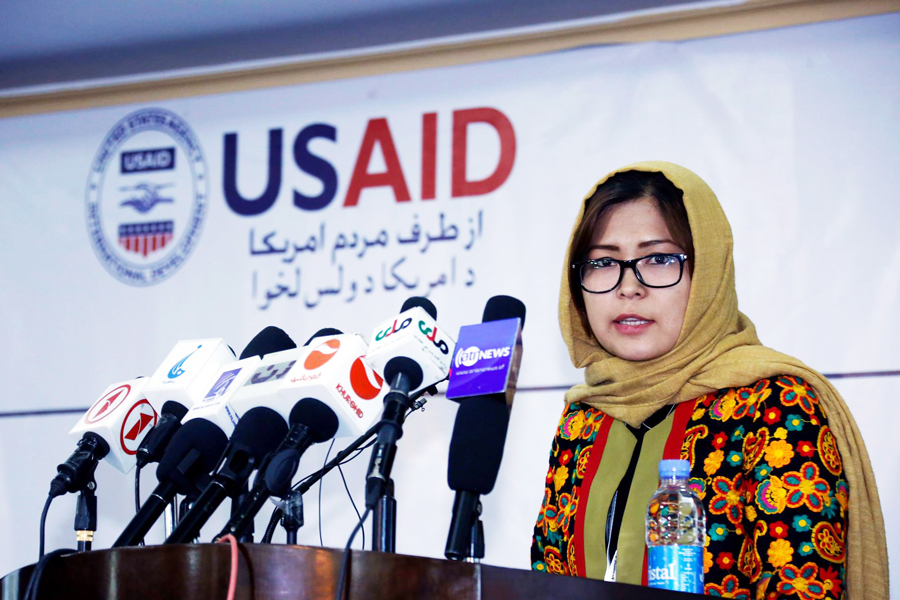
Business Summit Inspires New Training
In April 2018 in Kabul, 140 businesswomen from 21 Afghan provinces convened for the Forward Together: National Business Women’s Summit, organized by WIE. They discussed operational, marketing, and management issues and business environment challenges, including accessing finance and new markets, registering and licensing businesses, managing taxes, developing skills among women in the workforce, packaging products, and improving business services and the business enabling environment for women.
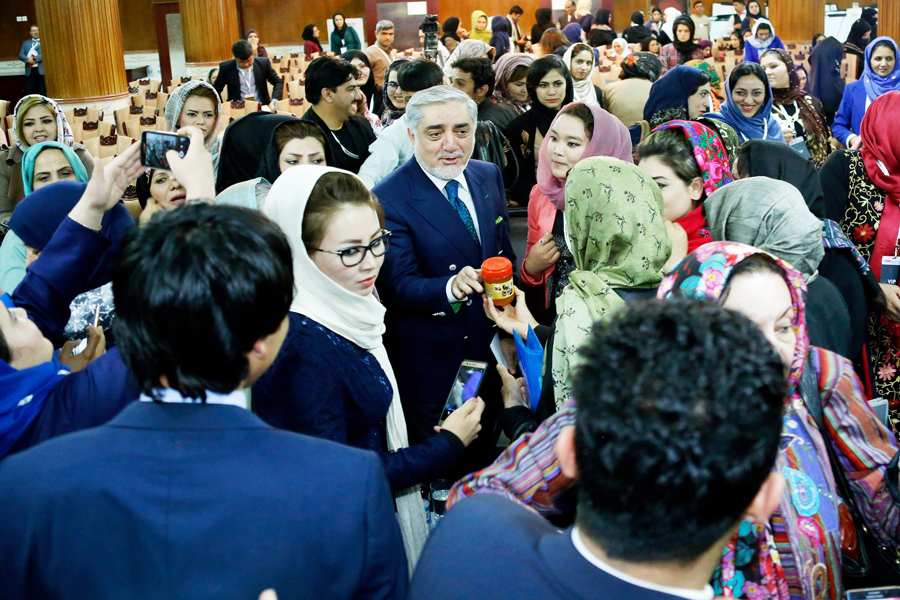
Deputy Ministers from the ministries of Women’s Affairs and Commerce and Industry attended the VIP closing session, where H.E. Dr. Abdullah Abdullah, the Chief Executive of the Islamic Republic of Afghanistan, emphasized full government support for the long-term strategies and reforms needed to assist Afghan businesswomen. The summit yielded a blueprint for action that WIE and others are acting on today.
DAI incorporated participants’ feedback into the final year of WIE programming, which ends in June 2019. One new initiative is the Finance Corps, which will help women-led businesses improve their financial literacy and management, bookkeeping systems, inventory and pricing, investment decisions, and operational efficiency. In addition, WIE is planning a product development service that will teach Afghan MBA graduates, consultants, and service providers to assist women’s businesses in improving product quality, packaging, and regulatory compliance. The service will initially focus on the food processing sector.
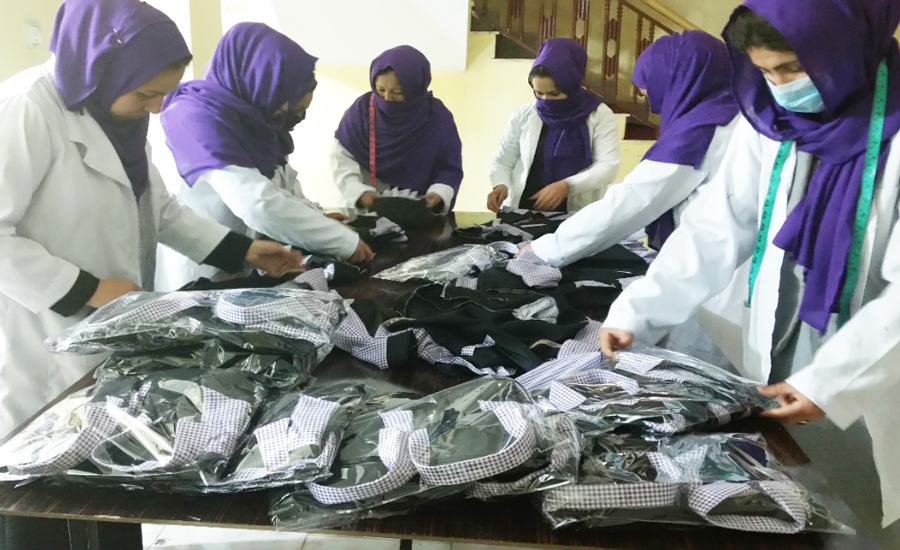
Women Lenders Spark New Lending
The summit highlighted how women who own businesses or are self-employed need better access to financing. One way to tackle this long-term problem is for more women to serve in mid- and senior-level positions in banking, microfinance, and commercial lending.
More than 100 young women in Kabul, Herat, and Mazar-i-Sharif have completed WIE’s Microfinance Training Program, 53 of whom have been hired full-time within the microfinance institutions where they apprenticed or at a similar institution.
Increasing the number of women in the finance sector, particularly in decision-making and lending roles, will make it more comfortable for other women to seek out financial services, many for the first time.
The success of the Microfinance Training Program inspired WIE to design the Women in Commercial Banking activity, which aims to increase the presence and roles of women in banking, first in Kabul and then in other regions. Comprehensive classroom training will be followed by placement in three-month internships in commercial banks, where WIE anticipates 20 percent of these women will be retained as full-time employees.
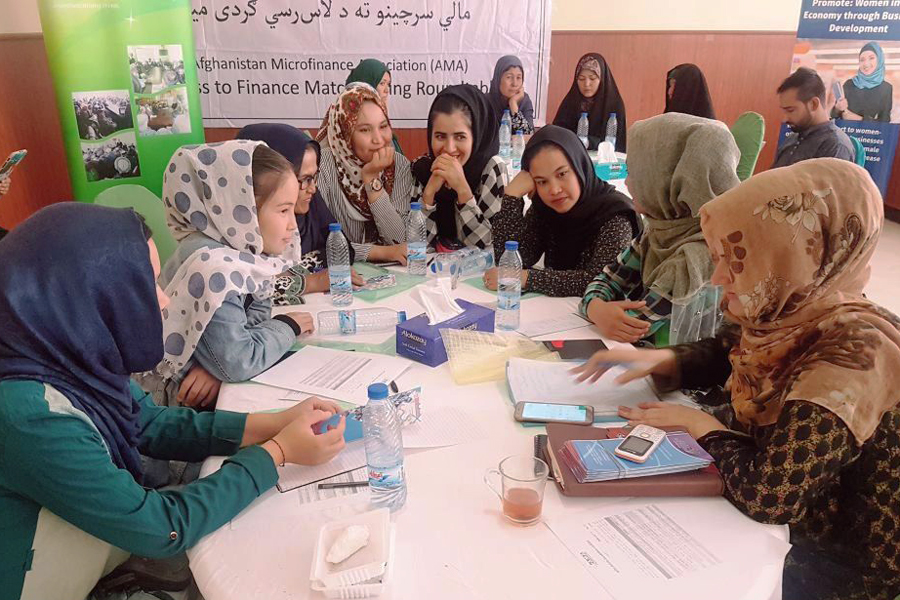
WIE’s Access to Finance (A2F) Matchmaking Roundtables have helped businesses learn about borrowing and facilitated mutually beneficial relationships between their representatives and lenders. Through June 2018, WIE had hosted 30 A2F awareness-raising events in Kabul, Herat, and Mazar-i-Sharif, leading to 157 small loans, which combined with WIE’s direct-loan facilitation services are worth approximately US$170,000. These loans are typically used to buy the fixed assets needed to help a business grow.
This small-business lending is catching on—according to the Afghanistan Microfinance Association, a WIE grantee, as of December 2017 more than 77,000 women held active loans with financial institutions in 18 provinces of Afghanistan, representing 39 percent of the microfinance sector.
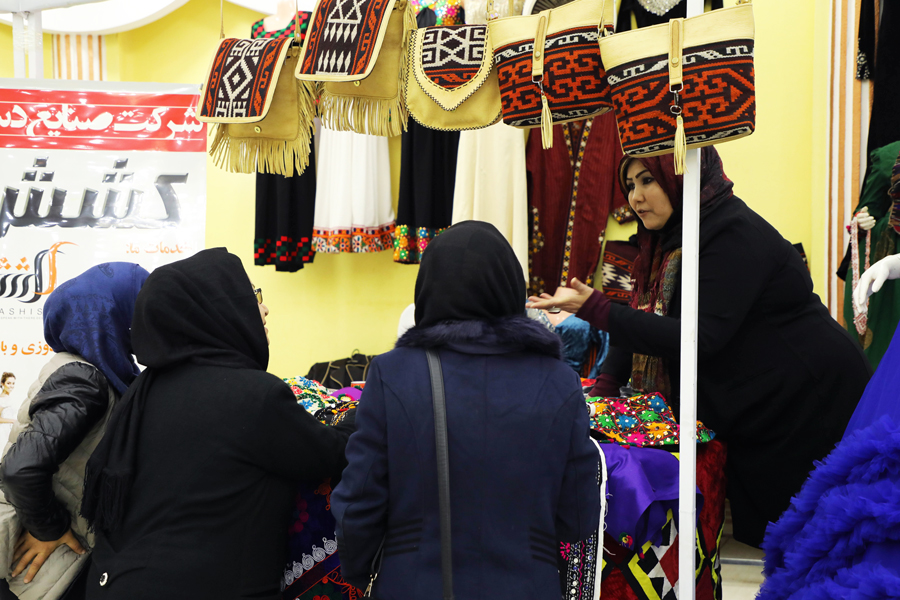
Promoting Sales and Familiarity Through Trade Fairs
Regional trade fairs have proven effective at introducing Afghan women to the private sector and formal economy. These exhibitions have helped WIE clients find customers, suppliers, and contractors and improve their understanding of doing business. Over the past year, WIE organized five Forward Together: Women in Business Regional Trade Fairs—one each in the regional hubs of Kandahar, Jalalabad, Mazar-i-Sharif, Herat, and Kabul. Each event featured 25 to 30 women-owned or -managed businesses, with each representative first mentored in best practices for trade fair business and sales, followed by the actual experience and chance to network with buyers, distributors, and agents.
The best-performing businesses earned a trip to the First Women Power Expo, held in June 2018 in Kabul. Nearly 100 WIE client businesses participated in the four-day national trade fair, held prior to the Eid holidays, Afghanistan’s busiest retail season. These included enterprises in jewelry/gemstones, garment and handicraft manufacture, dairy and food processing, business service providers, ICT and mobile app providers, and education—sectors where women are particularly active. Many of these businesses were participating in a national trade event for the first time.
On-site sales by WIE client businesses topped US$50,000 at the national event and $125,700 for all events combined. More significantly, they also signed 1,500+ wholesale or supply contracts, representing future transactions of approximately US$5.5 million, with another 3,000+ potential contracts in negotiation.
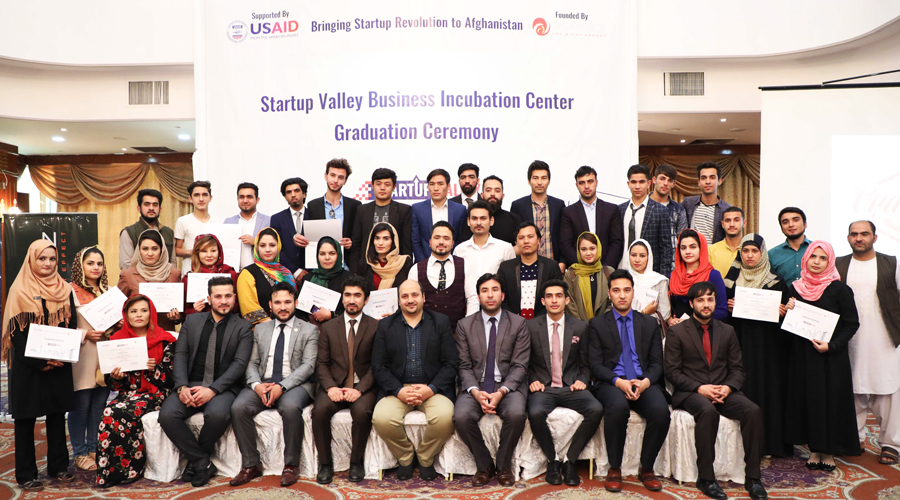
Professionalizing Women-Led Startups
In any economy, fresh business energy and thinking can forge new avenues for growth. WIE’s entrepreneurial workshops and learning programs have introduced aspiring entrepreneurs to experienced counterparts who have successfully navigated the startup process.
In Kabul, two business incubators—Startup Valley (a WIE grantee) and Founder Institute—have graduated nearly 50 startups, many of which are woman-owned or -led, creating more than 200 jobs. These include startups in mobile applications and other IT solutions, online retail sales, graphic design, legal services, agricultural consulting, dairy and food processing, and light manufacturing.
These and other emerging businesses have benefited from WIE’s MBA Corps program, which demonstrates the value of trained managers to owners of small and medium-sized women’s enterprises, some of which cling to traditional practices of retaining family or clan members instead of employing professional managers. WIE has matched MBA graduates with 58 client businesses in Kabul, Herat, and Mazar-i-Sharif. Under a six-month agreement, a WIE mentor, the MBA graduate, and the business owner work to ensure each brings value to the respective enterprise and each other.
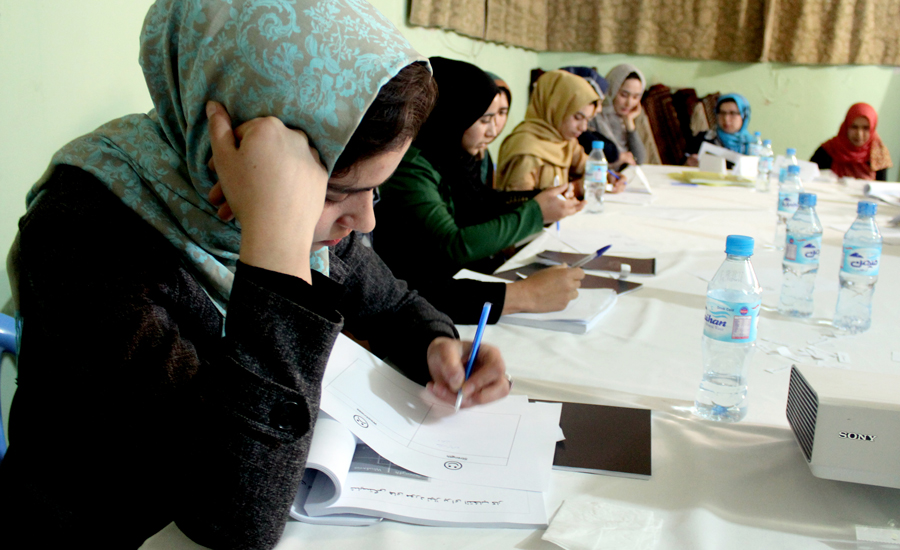
Sustainable, Generational Economic Growth
Sustaining the participation of women in Afghanistan’s mainstream economy requires a long-term, holistic approach. WIE incorporates youth into training programs so older and younger businesswomen and trainees learn from one another. As businesses owned or managed by women become more confident and vocal, and enter the forefront of Afghanistan’s business community, this movement will pave the way for more women with a business idea to step forward or seek skills training. Many of WIE’s client businesses start as small, home-based ventures, become viable with strategic assistance, and, in turn, create jobs. WIE considers no venture too small to start.
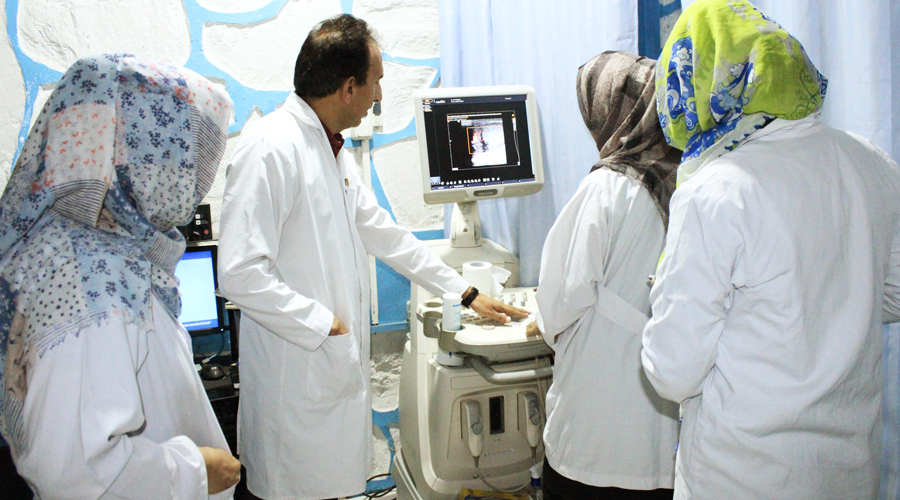
The time has come to change the mindsets of Afghans—especially young ones—from being observers of government-sponsored programs to becoming employers and job creators through their own efforts. Afghanistan’s government, through its Women’s Economic Empowerment National Priority Program, is on board, though translating that commitment into practice requires practical assistance. By enabling more women to enter the formal economy and start and grow businesses, USAID’s Promote: Women in the Economy is laying a foundation for Afghanistan to sustainably create jobs, grow its economy, and deliver stability and prosperity.